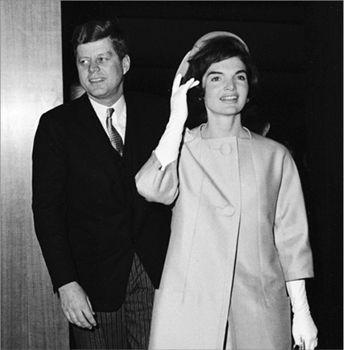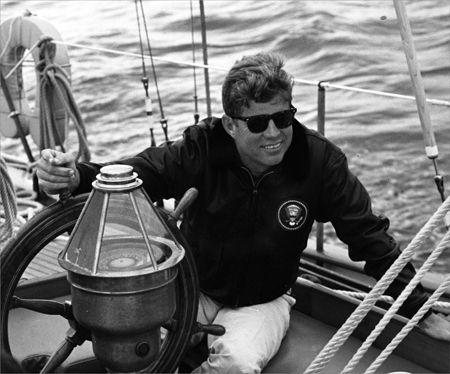Kennedy's Last Days: The Assassination That Defined a Generation (17 page)
Read Kennedy's Last Days: The Assassination That Defined a Generation Online
Authors: Bill O'Reilly

The rifle arrives on March 25. Marina complains that they could have used the money for food. But Oswald is pleased with the purchase and gets in the habit of riding the bus to a dry riverbed for target practice.
On March 31, while Marina is hanging diapers on the clothesline to dry, Oswald steps into the backyard dressed all in black. His new pistol is tucked into his belt. He waves the rifle in one hand and holds copies of two Communist newspapers in the other. He demands that an amused Marina take photographs of him. He plans to send them to the newspapers to show that he is prepared to do anything to support communism.
On April 6, 1963, Lee Harvey Oswald is fired from his job at Jaggars-Chiles-Stovall. His communist rants have grown offensive to coworkers, and his bosses claim he has become undependable.
On April 10, 1963, Oswald decides it’s time to kill someone.

Lee Harvey Oswald in his yard, holding his rifle and newspapers.
[© Corbis]
CHAPTER SIXTEEN
APRIL 1963
Washington, D.C.
T
HE MAN WITH SEVEN MONTHS TO LIVE
is thinking about a faraway war that is gaining steam.
Dwight Eisenhower was the first president to send American soldiers to Vietnam. He and his advisers were afraid that if Vietnam became communist, the countries around it would, too, and then all of Southeast Asia would turn its back on democracy. But it is John Kennedy who orders a gradual escalation in the number of troops, hoping to ensure that Vietnam does not fall.
Kennedy’s good intentions have gone awry, however. The original handful of American “advisers” in Vietnam has now swelled to almost 16,000 pilots and soldiers. They hope to destroy the rebel Viet Cong army that is fighting the U.S.-backed Vietnam government. Thousands of Viet Cong soldiers have been killed—as have thousands of innocent Vietnamese citizens.
John Kennedy believes that America needs to end the Vietnam conflict, though he is not quite ready to go public with this. “We don’t have a prayer of staying in Vietnam,” he will tell Pulitzer Prize–winning journalist Charles Bartlett off the record. “Those people hate us. They are going to throw [us] out of there at almost any point. But I can’t give up a piece of territory like that to the Communists and then get the American people to reelect me.”

Soon after taking office, Kennedy gave the press an update on Communist-held areas in Southeast Asia.
[JFK Presidential Library and Museum]
To safeguard his chances for staying in office, the president cannot, and will not, pull U.S. troops out of Vietnam until after the 1964 election. The war is still popular with voters.
CHAPTER SEVENTEEN
APRIL 10, 1963
Dallas, Texas
O
N A HOT
A
PRIL NIGHT,
Lee Harvey Oswald hides in the shadows of a Dallas alleyway. His new rifle is pointed at Major General Ted Walker. The 53-year-old West Point graduate is a famous opponent of communism. One of the communist newspapers Oswald subscribes to has targeted the general as dangerous to its beliefs because he publicly warns Americans about the threat of communism.
Lee Harvey Oswald finds strength in the ideals of communism. He believes that the profit from everybody’s work should be shared equally by all. He thinks if the country were organized that way, then there would be no poor people and everyone would be equal. Perhaps he has forgotten his experiences in the factory in Russia where he was so unhappy.
After almost a year back home in America, he has become enraged by what he perceives as the injustices he sees around him. He is angry enough to kill any man who speaks out against communism.
This is why he is aiming his brand-new rifle with murderous intent at Ted Walker’s head.

Former Major General Edwin A. “Ted” Walker speaks with reporters the morning after a bullet narrowly missed him.
[© Bettmann/Corbis]
Walker sits in the study of his Dallas home looking at his 1962 tax returns. The desk lamp is the room’s only light. A small window looks out into the darkness.
Lee Harvey Oswald’s hiding spot in the alley is just 40 yards away. He watches Walker’s every move through the telescopic sight of his rifle. The sight is so strong that Oswald can see every strand of hair on Walker’s head. He takes aim. He has never shot a man before, or even fired a gun in anger. But he spent hours on the firing range back in his Marine Corps days, and these last few weeks he has been diligently working on his accuracy down in the dry bed of the Trinity River.
Oswald squeezes the trigger. He fires just one shot. Then he turns and runs as fast and as far as he can.
* * *
“I shot Walker,” Oswald breathlessly tells Marina. It’s 11:30 at night. She has been worried sick about his absence.

A photo of General Walker’s house that was in Lee Harvey Oswald’s wallet when he was arrested.
[© Corbis]
“Did you kill him?” she asks.
“I don’t know,” he replies in Russian.
“What did you do with the rifle?”
“Buried it.”
Oswald turns on the radio to see if he’s made the news yet.
The Walker assassination attempt is in the newspapers and on the radio the next morning. Oswald hangs on every word, though he is appalled to learn that he missed his target completely. Eyewitnesses claim they saw two men fleeing the scene in a car, and Dallas police are looking for a gun that takes a completely different sort of ammunition from the kind Oswald fired. Oswald is crestfallen. He shot at Walker because he wanted to be a hero in the eyes of the Communist Party; he wanted to be special. Now not only has he botched the shot, but he is worse than a failure—he is anonymous.
On April 21, Marina sees Oswald getting ready to leave the house with a pistol tucked in his waistband. It’s a Sunday. He’s wearing a suit. Marina furiously demands to know where he’s going. “Nixon is coming,” Oswald tells her. “I’m going to go check it out.”
The former vice president has just made headlines in the morning paper by demanding the removal of all Communists from Cuba. Like General Walker, Richard Nixon has been making a political name for himself by denouncing Communists.
“I know how you look,” Marina says. Her husband’s idea of checking out a situation is to fire a shot at a human being. Marina Oswald shoves her husband into their tiny bathroom and forces him to remain there for the rest of the day. By the time she sets him free, Marina hopes that Nixon has left Dallas.
CHAPTER EIGHTEEN
THE WHITE HOUSE
Washington, D.C.
D
ESPITE THE CRISES AND LONG HOURS,
John Kennedy truly enjoys his job, and it shows. Friends note how much he has grown as a leader during his time in office and the energy with which he tackles his work.
But there is a flip side to the president’s popularity polls: 70 percent of the nation may love JFK, but the other 30 percent hate him. In Miami, many in the Cuban exile community are bitter about the Bay of Pigs debacle and want revenge. In the South, rage at the president’s push for racial equality is widespread.

The public lives of the president and his wife required many dinners, parties, and ceremonial occasions.
[JFK Presidential Library and Museum]
JFK is aware of his enemies but is also conscious of the positive news people read each day in the headlines: Gordon Cooper completes America’s longest space flight, orbiting Earth 22 times; the U.S. crop harvest exceeds expectations; Peace Corps volunteers reach 7,000; and the world hails Kennedy’s prodemocracy speech at the Berlin Wall.

Private time and vacations were few and much cherished by the family. Kennedy loved being on the water. Here he is aboard a U.S. Coast Guard boat off the coast of Maine.
[JFK Presidential Library and Museum]